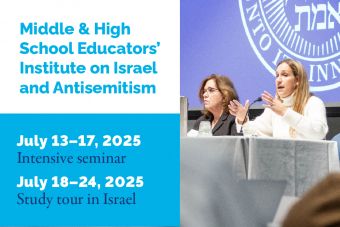- Education Topics
- Achievement Gap
- Alternative Education
- American Education Awards
- Assessment & Evaluation
- Education during COVID-19
- Education Economics
- Education Environment
- Education in the United States during COVID-19
- Education Issues
- Education Policy
- Education Psychology
- Education Scandals and Controversies
- Education Reform
- Education Theory
- Education Worldwide
- Educational Leadership
- Educational Philosophy
- Educational Research
- Educational Technology
- Federal Education Legislation
- Higher Education Worldwide
- Homeless Education
- Homeschooling in the United States
- Migrant Education
- Neglected/Deliquent Students
- Pedagogy
- Sociology of Education
- Special Needs
- National Directories
- After School Programs
- Alternative Schools
- The Arts
- At-Risk Students
- Camps
- Camp Services
- Colleges & Universities
- Counties
- Driving Schools
- Educational Businesses
- Financial Aid
- Higher Education
- International Programs
- Jewish Community Centers
- K-12 Schools
- Language Studies
- Libraries
- Organizations
- Preschools
- Professional Development
- Prom Services
- School Assemblies
- School Districts
- School Field Trips
- School Health
- School Supplies
- School Travel
- School Vendors
- Schools Worldwide
- Special Education
- Special Needs
- Study Abroad
- Teaching Abroad
- Volunteer Programs
- Youth Sports
- For Schools
- Academic Standards
- Assembly Programs
- Blue Ribbon Schools Program
- Educational Accreditation
- Educational Television Channels
- Education in the United States
- History of Education in the United States
- Reading Education in the U.S.
- School Grades
- School Meal Programs
- School Types
- School Uniforms
- Special Education in the United States
- Systems of Formal Education
- U.S. Education Legislation
- For Teachers
- Academic Dishonesty
- Childcare State Licensing Requirements
- Classroom Management
- Education Subjects
- Educational Practices
- Interdisciplinary Teaching
- Job and Interview Tips
- Lesson Plans | Grades
- Professional Development
- State Curriculum Standards
- Substitute Teaching
- Teacher Salary
- Teacher Training Programs
- Teaching Methods
- Training and Certification
- For Students
- Academic Competitions
- Admissions Testing
- At-Risk Students
- Career Planning
- College Admissions
- Drivers License
- Educational Programs
- Educational Television
- High School Dropouts
- Higher Education
- School Health
- Senior Proms
- Sex Education
- Standardized Testing
- Student Financial Aid
- Student Television Stations
- Summer Learning Loss
Home | National Directories | Professional Development & Teacher Workshops | Middle & High School Educators' Institute on Israel and Antisemitism |
Middle & High School Educators' Institute on Israel and Antisemitism

Basic Information
Workshop run by: Brandeis University President's Initiative on Antisemitism
Location:
Waltham, MA
Address: 415 South St.
MS 074
Waltham, MA 02453
Phone Number: 781-736-3802
Email: BUPIA@brandeis.edu
Registration Website: https://www.brandeis.edu/antisemitism/programs/educator-institute.html
Presenter: Leading academics, researchers, educators and practioners
Additional Information
Fees: Free (participants responsible for travel costs to Brandeis and from NYC at end of study tour)
Registration Date: Applications Due April 1, 2025
Eligible Audience: humanities teachers, directors of teaching and learning or curriculum directors, principals, district heads, superintendents, heads of school, DEI professionals, teacher's union leaders, and other educational leaders currently employed at public or independent schools in U.S.
Credits Awarded: none
Materials:
Readings, handouts and other instructional materials will be provided, when applicable.
Workshop Highlights:
-
In-Person, Residential Seminar at Brandeis University
-
Immersive Study Tour of Israel (*and the West Bank, pending security conditions)
-
Focus on Understanding Israel and Antisemitism: Engage with historians, educators, and community leaders to deepen subject knowledge and enhance classroom instruction.
-
Generous Stipends provided to all participants.
Description:
The Brandeis University President's Initiative on Antisemitism is pleased to announce that applications are now being accepted for its inaugural Middle & High School Educators' Institute on Israel and Antisemitism. This eleven-day summer institute for public and independent school educators and leaders includes an intensive five-day residency at Brandeis University, July 13-17, 2025, followed by a six-day study tour in Israel*, July 18-24, 2025. We strongly encourage educators to apply as a team of 8-10 individuals from within a particular region and community.
Participants will engage with leading academics and practitioners on topics such as: the history of Zionism and Israel; Israeli society and Hebrew culture; the diversity of the Israeli population -- ethnically, religiously, culturally; Palestinian history and society; Arab and Israeli relations and conflicts; geopolitics of the region; the relationship of Israel to antizionism and contemporary antisemitism; educational resources and materials; teaching Israel in a time of conflict; lesson planning and best practices.
The Educators' Institute recognizes that many young students in the U.S. primarily learn about Israel through mainstream and social media, where misinformation and disinformation can easily shape their views. Many middle and high school educators feel unprepared to address the complexities of Israel and contemporary antisemitism. They are seeking the knowledge, skills, and support needed to confidently engage with students on these topics in the classroom and within the broader school community.
The Institute aims to equip middle and high school leaders and educators with:
- A solid foundation of knowledge and shared language to explore the complexities of Israeli and Palestinian history and society, as well as contemporary manifestations of antisemitism and antizionism.
- Skills to effectively teach these topics in the classroom.
- A supportive space outside of school for educators to lean in with curiosity and grapple with complex subject matter, allowing them to model this process for their students.
- Opportunities to network with fellow educators and build professional connections.
- Exposure to a wide range of educational content, providers and resources.
- Access to ongoing learning resources, both online and in-person.
*and the West Bank if security conditions allow.





